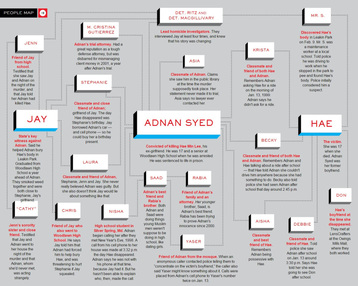

- #Serial podcast episode 7 season 1 transscript serial
- #Serial podcast episode 7 season 1 transscript trial
For instance, one person cites Adnan’s ability to smooth over rough situations as proof that he’s a good guy, while another points to that same quality as a sign that he’s sneaky. The same example of any behavior can be used as evidence of good character or questionable character - it’s all subjective.

It’s only human to feel like we can sense a murderer, but do humans have that capacity? “Can you tell - really - can you tell if someone has a crime like this in him?” asked Koenig. Amateur sleuths will be disappointed that rather than evidence, we get debate about how we can tell if someone is capable of murder. This week’s episode might be the weakest yet, because there is no new evidence presented. READ MORE: Obsessed with “Serial?” You’ll Love These Documentaries The Newest Evidence Does that make him a killer? We finally get a sense of Adnan’s frustration about how he’s been portrayed in the podcast - one moment, he feels like Koenig is his savior, the next, his executioner.Īnd really, how would any of us fare if a journalist began to dig into our teenage behavior, and interview former middle school and high school classmates about our personality and recount the times where we broke the law by shoplifting, drinking underage or smoking pot? Does any of that have any relevance to this specific crime? Is someone who steals money from a mosque more likely to be a killer? Is it evidence of bad character? But even then, rumors abound, with one person asserting that he stole as much as hundreds of thousands of dollars, which Koenig finds not to be the case.īut as Adnan himself points out, he has always admitted that he stole money from the mosque. Though Koenig says callers have informed her that Adnan has done bad things in his past, the only wrongdoing she can confirm is that he stole donation money from his mosque during the summer before 8th grade. Original scoring by Nick Thorburn, who wrote the theme song, and Mark Henry Phillips, who mixed the show.Koenig speaks to people within the Muslim community in Baltimore, who generally all agree that Adnan is a “good guy” even though some accuse him of being duplicitous or even a psychopath (but still a “good guy!”). Production and operations managed by Emily Condon. This episode of “Serial” was produced by Sarah Koenig, Julie Snyder and Dana Chivvis, with editorial advisory by Ira Glass and editing help from Nancy Updike.
#Serial podcast episode 7 season 1 transscript serial
The New York Times Company acquired Serial Productions in 2020. “Serial” has been downloaded 1 billion times and won the Peabody and the Nobel Prize. When it launched in 2014, “Serial” became a global sensation that has been credited with launching the modern era of audio journalism. The high-school scene, the shifting statements to the police, the prejudices, the sketchy alibis, the scant forensic evidence - all of it leads back to the most basic questions: How can you know a person’s character? How can you tell what they’re capable of? In Season One of “Serial,” she looks for answers.
#Serial podcast episode 7 season 1 transscript trial
She discovered that the trial covered up a far more complicated story than the jury - or the public - ever got to hear. Sarah Koenig sorted through thousands of documents, listened to trial testimony and police interrogations, and talked to everyone she could find who remembered what happened between Adnan Syed and Hae Min Lee. Some people believe he’s telling the truth. But Adnan has always maintained he had nothing to do with Hae’s death.

The case against him was largely based on the story of one witness, Adnan’s friend Jay, who testified that he helped Adnan bury Hae’s body. Her 17-year-old ex-boyfriend, Adnan Syed, was charged with murder, and within a year, he was sentenced to life in prison. A month later, her body was found in a city park. A high-school senior named Hae Min Lee disappeared one day after school in 1999, in Baltimore County, Maryland.


 0 kommentar(er)
0 kommentar(er)
